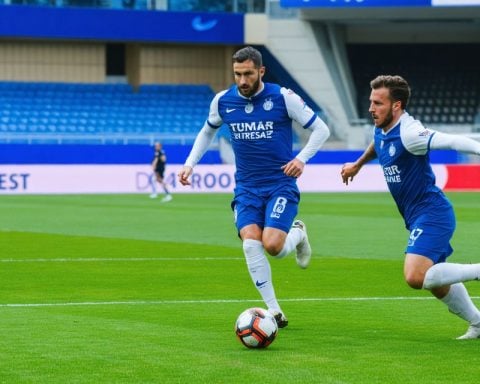- The WTA has banned Stefano Vukov from coaching, hinting at a year-long suspension due to a confidential investigation.
- Vukov, former coach of Elena Rybakina, is accused of violating the WTA Code of Conduct, including mental abuse allegations.
- The investigation highlighted Vukov’s inappropriate behavior, such as mocking Rybakina and ignoring a “no contact” order.
- Despite the controversy, Rybakina has publicly refuted claims of abuse and remains focused on her tennis career.
- Goran Ivanisevic has distanced himself due to the disruption caused by Vukov’s suspension.
- The WTA emphasizes its dedication to maintaining a safe and respectful environment for all athletes.
The tennis universe stands agog as the Women’s Tennis Association (WTA) has barred Stefano Vukov from coaching, unfurling a tempestuous episode in professional tennis. The WTA’s decision, cloaked in a shroud of confidentiality, hints at a year-long suspension, whisper insiders familiar with the inner workings of this high-stakes investigation.
Vukov, the former guide for Elena Rybakina, found himself embroiled in controversy, accused of flouting the WTA Code of Conduct. Allegations paint a disturbing portrait: Vukov subjected Rybakina to mental torment and pushed her to her limits, transforming practice sessions into anguishing trials. His actions reportedly reduced her to tears and scorned her as “still being in Russia picking potatoes” if not for his mentorship.
Adding fuel to this fiery saga, Vukov ignored a stern “no contact” directive, badgering Rybakina with unwelcome texts during the prestigious U.S. Open. Yet, complexities abound as there are murmurings of a personal entanglement between the two, which raises eyebrows but does not sway the outcome of the investigation.
Amid this turmoil, the resilient Rybakina remains steadfast, repeatedly dismissing claims of abuse. Her journey through the tournament maze, shadowed by suspicion, spotlighted her unwavering fortitude as she battled her way to the Qatar Open quarterfinals. Meanwhile, her tennis odyssey faced a twist with Goran Ivanisevic stepping aside, flustered by the swirling storm Vukov’s suspension brought to the stage.
As the tennis world grapples with this tangled narrative, one thing resonates clearly: the unwavering commitment to a secure and respectful environment for athletes cannot waver. With the thunderous echoes of Vukov’s controversial exit reverberating, the WTA’s decisive move serves as a stark reminder of the standards held within the realm of professional sports.
Shocking Truths Behind WTA Coaching Controversies: What You Need to Know
Understanding the WTA’s Stance on Coaching Conduct
The WTA’s decision to suspend Stefano Vukov illuminates the complex dynamics and expectations within the world of professional tennis coaching. This action underscores the importance of maintaining a supportive and respectful environment for athletes, ensuring their mental and physical well-being. Below, we delve into several aspects not fully explored in the original article.
How-To Steps & Life Hacks: Maintaining Professional Boundaries in Coaching
1. Clear Communication: Establish clear lines of communication between coach and player, setting boundaries that both parties agree upon.
2. Regular Check-ins: Schedule regular meetings to discuss the player’s progress and address any concerns, fostering transparency and mutual respect.
3. Focus on Positive Reinforcement: Emphasize encouragement and positive feedback to motivate athletes without resorting to negative criticism.
4. Document Interactions: Keep records of coaching sessions and communications to provide clarity and accountability.
Real-World Use Cases: Impacts of Coaching Dynamics
– Player Performance: Effective coaching that builds trust can lead to improved performance and mental resilience, as evidenced by players like Naomi Osaka and her partnership with Sascha Bajin, which led to multiple Grand Slam victories.
– Career Longevity: Supportive coaching relationships contribute to athletes’ career longevity by reducing burnout and maintaining enthusiasm for the sport.
Controversies & Limitations: Complexities of Coach-Player Relationships
The Vukov case highlights potential pitfalls in coach-player dynamics, especially when personal relationships blur professional boundaries. Alleged mental abuse and disregard for boundaries highlight the need for clear ethical standards and consequences.
Market Forecasts & Industry Trends: Women’s Tennis Coaching
The industry is witnessing a growing emphasis on holistic coaching approaches that consider mental health, emotional intelligence, and personal development alongside technical skills. As the importance of these factors becomes clearer, demand for coaches who can deliver on these fronts is expected to rise, reshaping the coaching market.
Security & Sustainability: WTA’s Role
The WTA aims to foster a safe sporting environment, evidenced by their decisive response to infractions of conduct. Their policies encourage sustainable sporting careers by prioritizing athlete welfare.
Reviews & Comparisons: Coaching Styles in Spotlight
Comparisons are often drawn between coaches with different approaches, such as Patrick Mouratoglou’s data-driven strategy contrasting with Toni Nadal’s focus on resilience and mental toughness. Understanding these differences helps players choose the best fit for their performance goals.
Pros & Cons Overview: WTA’s Decision
Pros:
– Upholds ethical standards in tennis.
– Protects player welfare and promotes respectful professional relationships.
– Sets a precedent for accountability in coaching conduct.
Cons:
– May lead to controversies if details are not transparent.
– Could dissuade potential coaches wary of strict oversight.
Recommended Actions for Players and Coaches
For players:
– Choose Coaches Wisely: Ensure your coach is someone who respects your boundaries and supports your mental and physical well-being.
– Speak Out: Don’t hesitate to raise concerns if you experience disrespectful behavior.
For coaches:
– Understand Regulations: Familiarize yourself with WTA guidelines and commit to maintaining ethical coaching practices.
– Prioritize Athlete Well-being: Always prioritize the mental and physical health of your players.
For more information, visit the WTA website.
By understanding these dynamics, players and coaches can foster relationships that support both athletic performance and personal development, preventing issues like those seen in the Vukov case.


















